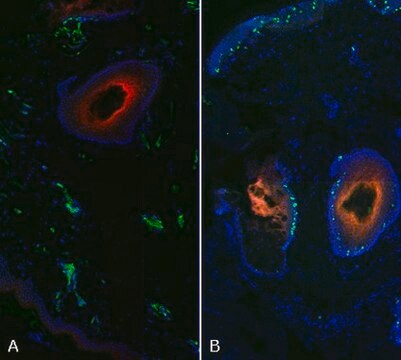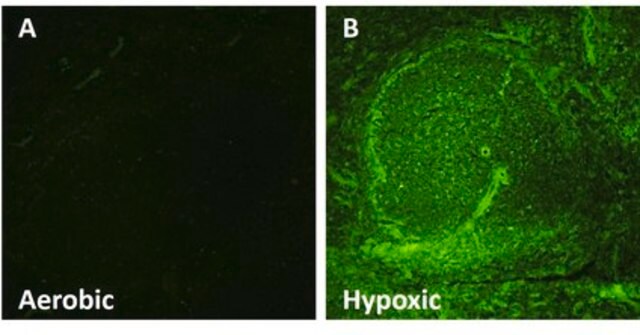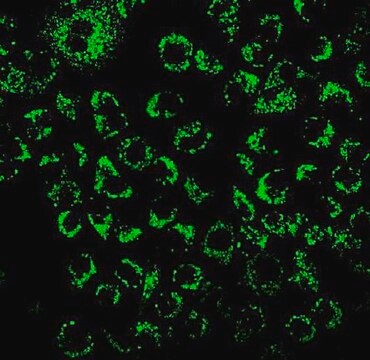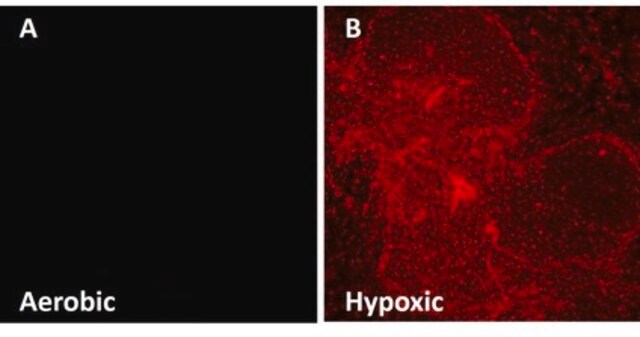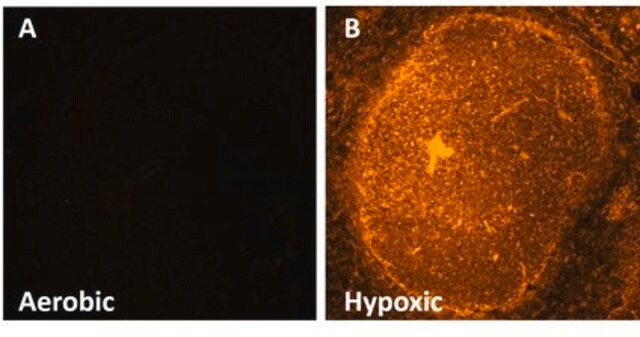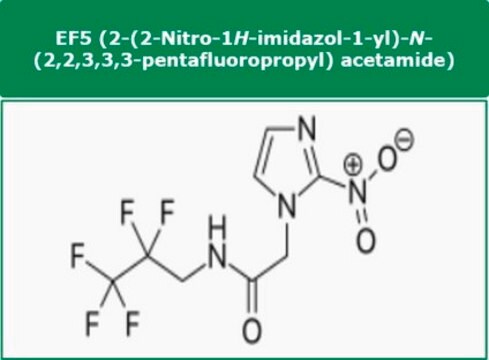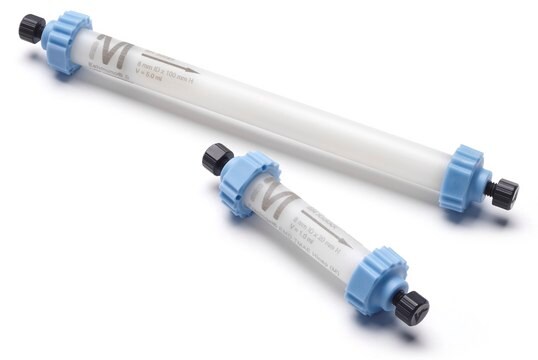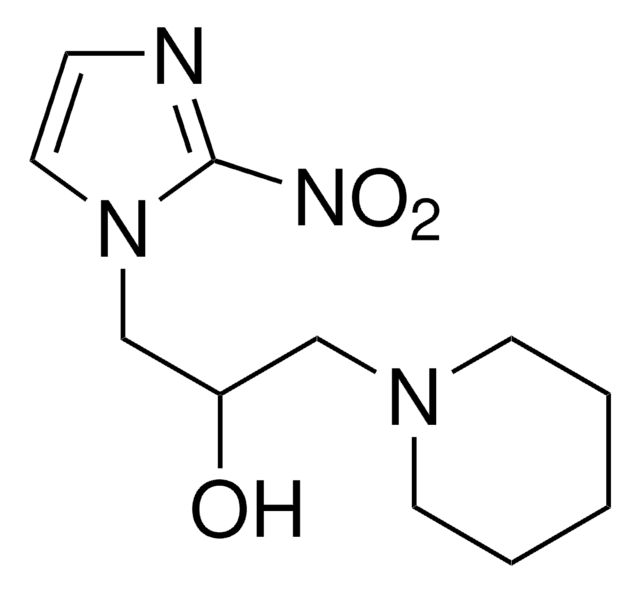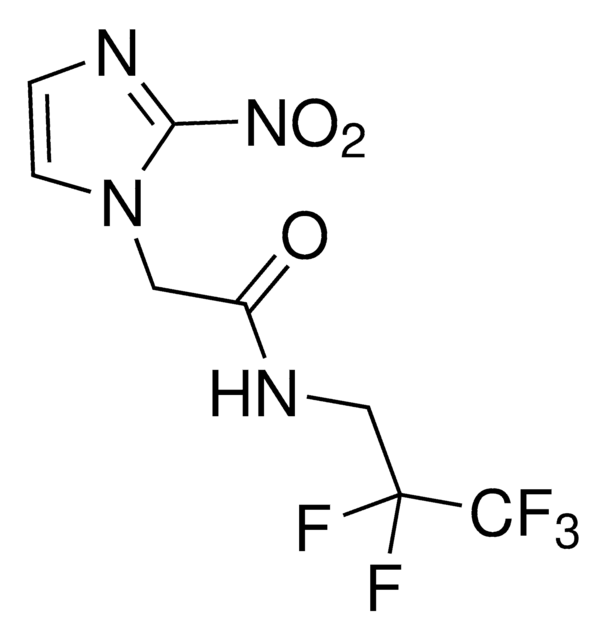EF5-30C3M
EF5 Hypoxia Detection Kit, Cyanine 3
Sinônimo(s):
Antibody-based EF5 detection
Faça loginpara ver os preços organizacionais e de contrato
About This Item
Código UNSPSC:
12352207
eCl@ss:
32161000
NACRES:
NA.32
Produtos recomendados
técnica(s)
immunofluorescence: suitable
immunohistochemistry: suitable
Nível de qualidade
método de detecção
fluorometric
Descrição geral
A number of imaging markers which target hypoxia exist and are widely used in research. EF5 is a compound developed at the University of Pennsylvania by Dr. Cameron Koch and Dr. Sydney Evans. Upon injection into animal tissues, EF5 selectively binds to hypoxic cells and forms adducts. A mouse monoclonal antibody, clone ELK3-51 which is directly conjugated to Cyanine 3 is then used to selectively bind the EF5 adducts.
Advantages of the EF5 Hypoxia Detection Kit:
• EF5 exists in only one form:
Pimidozole, an alternative hypoxia marker, exists in two forms; one of which is charged and very hydrophilic, the other lipophilic. Pimidozole thus has a very complex biodistribution. In contrast, EF5 is lipophilic and uncharged and this allows very rapid and even tissue distribution.
• EF5 binding images can be calibrated to provide quantitative data on the pO2 values of each cell (Koch CJ, 2002):
The fluorescent images obtained from EF5 binding can be calibrated according to camera settings and a “cube-binding” value which is obtained through a separate procedure. The intensity values of calibrated images are directly related to actual tissue pO2 values. As a result, these images provide information regarding not only where hypoxic areas may or may not be, but also data regarding the distribution and levels of hypoxia.
Reference:
Koch CJ (2002) Measurement of absolute oxygen levels in cells and tissues using oxygen sensors and 2-nitroimidazole EF5. Methods in Enzymology 352: 3-31.
Advantages of the EF5 Hypoxia Detection Kit:
• EF5 exists in only one form:
Pimidozole, an alternative hypoxia marker, exists in two forms; one of which is charged and very hydrophilic, the other lipophilic. Pimidozole thus has a very complex biodistribution. In contrast, EF5 is lipophilic and uncharged and this allows very rapid and even tissue distribution.
• EF5 binding images can be calibrated to provide quantitative data on the pO2 values of each cell (Koch CJ, 2002):
The fluorescent images obtained from EF5 binding can be calibrated according to camera settings and a “cube-binding” value which is obtained through a separate procedure. The intensity values of calibrated images are directly related to actual tissue pO2 values. As a result, these images provide information regarding not only where hypoxic areas may or may not be, but also data regarding the distribution and levels of hypoxia.
Reference:
Koch CJ (2002) Measurement of absolute oxygen levels in cells and tissues using oxygen sensors and 2-nitroimidazole EF5. Methods in Enzymology 352: 3-31.
Aplicação
Antibody is provided in a concentrated format at 2 mg/mL. For optimal performance, antibody should be diluted to a working concentration of at least 75 ug/mL. Refer to product datasheet for details.
Research Category
Cancer
Cancer
The EF5 Hypoxia Detection Kit provides a sensitive and quantitative method to detect and measure tissue hypoxia in animal and human tumors, normal tissues and cells.
Componentes
EF5 Compound, CAS 152721-37-4: (Part No. CS222743). 1 vial containing 30 mg. Store at -20°C.
Anti-EF5, clone ELK3-51 Cyanine 3 conjugate, 250 ug: (Part No. CS222730). 1 vial containing 125 uL mouse monoclonal antibody, provided at 2 mg/mL and formulated in PBS, 0.1% sodium azide, 30% glycerol and 1.5% BSA. Store at -20°C.
Anti-EF5, clone ELK3-51 Cyanine 3 conjugate, 250 ug: (Part No. CS222730). 1 vial containing 125 uL mouse monoclonal antibody, provided at 2 mg/mL and formulated in PBS, 0.1% sodium azide, 30% glycerol and 1.5% BSA. Store at -20°C.
Armazenamento e estabilidade
Store kit at -20°C.
Exoneração de responsabilidade
Unless otherwise stated in our catalog or other company documentation accompanying the product(s), our products are intended for research use only and are not to be used for any other purpose, which includes but is not limited to, unauthorized commercial uses, in vitro diagnostic uses, ex vivo or in vivo therapeutic uses or any type of consumption or application to humans or animals.
Código de classe de armazenamento
10 - Combustible liquids
Certificados de análise (COA)
Busque Certificados de análise (COA) digitando o Número do Lote do produto. Os números de lote e remessa podem ser encontrados no rótulo de um produto após a palavra “Lot” ou “Batch”.
Já possui este produto?
Encontre a documentação dos produtos que você adquiriu recentemente na biblioteca de documentos.
Nossa equipe de cientistas tem experiência em todas as áreas de pesquisa, incluindo Life Sciences, ciência de materiais, síntese química, cromatografia, química analítica e muitas outras.
Entre em contato com a assistência técnica